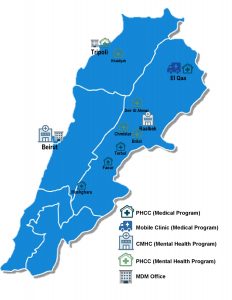Context
2020 has been a very challenging year over the world and especially for Lebanon. The country has been hit by a dire economic and financial crisis, by the COVID-19 pandemic and a massive explosion on August 4th. Collapse of the currency, fueling prices and medication shortages hinder access to healthcare and endanger people’s basic rights. More and more Lebanese, Syrian refugees, Palestinian refugees and migrant workers are pushed further into poverty.
Locations

Our Response
Since 2012, in cooperation with civil society organizations as well as national and local authorities, Médecins du Monde’s (MdM) intervention aimed at increasing access to quality primary healthcare and strengthening the national primary healthcare system. Moreover, MdM has been actively engaged in providing access to mental health and psychosocial support (MHPSS) services and in reducing the impact of the wide range of crisis on the mental and physical health of the Syrian and Palestinian refugees, vulnerable Lebanese and migrant workers.
Improving Access to Primary Healthcare Services
The improvement in access to primary healthcare (PHC) services aims at ensuring that host communities and refugees are able to receive critical preventive and curative services including health and mental health services, while enhancing the meaningful exercise of their rights and promoting their resilience and well-being through the services provided at PHC centers and community levels.
Médecins du Monde supports three partners’ PHC centers , which are part of the Ministry of Public Health’s National Network. The support is through the subsidization of services that include medical consultations by general and specialized physicians, acute essential medication, laboratory & imaging, physiotherapy, and Sexual and Reproductive health including family planning. MdM Team also builds the capacity of partner staff to improve the quality of services following the national accreditation standards provided by the Ministry of Public Health.
Furthermore, we are working on supporting the development of a multidisciplinary response to identify GBV survivors based on the principles of protection, gender and inclusion mainstreaming. The latter is achieved through the provisions of sensitization sessions to all healthcare workers as well as safe identification and referral to specialized case management agencies.

Improving Mental Health and Well-being of all People Living in Lebanon
Médecins du Monde contributed to the development of community-based mental healthcare services, opening and running community mental health centers (CMHCs) in Beirut and North Bekaa.
Multidisciplinary teams composed of case managers, psychotherapists, psychiatrists and nurses provide individualized and recovery-oriented services and consultations to people with mental health and substance use issues, based on personalized care and recovery plans.
MdM is also working on integrating mental health in the primary healthcare system. This involves strengthening the capacity of healthcare staff by providing training in techniques which will help them to identify mental health conditions and provide adequate care to patients. We are currently working closely with eight PHC centers in order to improve access to care through awareness sessions, trainings and shadowing of health care professionals.
Community – based Interventions
The Médecins du Monde team is supported by community outreach volunteers who are raising awareness on health and mental health topics and provide support by directing people to the appropriate facilities within their communities.
Supporting Mental Health Research
Médecins du Monde is also working in partnership with regional and international academic institutions to expand mental health research in the Middle East.
In 2019, we implemented two research projects in Lebanon in partnership with local and international institutions:
- BIOPATH is a project seeking to understand how environmental and biological risk and protective factors interact in the prediction of children’s resilience following war and displacement. This project is led in collaboration with Queen Mary University of London and the Institute for Development, Research, Advocacy and Applied Care (IDRAAC).
- t-CETA is a pilot project to trial the development, management and evaluation of a psychological intervention delivered by phone for Syrian refugee children in Lebanon. This project is led in collaboration with Queen Mary University of London, the American University of Beirut, Johns Hopkins University and Medical School Hamburg.
- Two studies will be published during 2021; (1) Gender determinants and how they affect access to mental health and substance use services among adults with mental health and/or substance use needs in Lebanon, the research findings will inform MdM in future interventions, as well as contribute to discussion with national stakeholders on policy and legal environment, (2) CMHC model documentation that presents the lesson learnt process of MdM on the experience of opening and running a CMHC, in order to identify successes, review challenges and have a list of recommendations.
Current partners
- Lebanon Ministry of Public Health (National Mental Health Program and Primary Healthcare Department)
- Rafic Hariri University Hospital (Beirut)
- Skoun
- Embrace
- International Committee of Red Cross
- Abaad
- Humanity and Inclusion (HI)
- Amel Association International
- The Parish El Qaa
- Beit El Baraka
Research partners
- Queen Mary University of London
- American University of Beirut
- John Hopkins University
- IDRAAC (Institute for Development, Research, Advocacy and Applied Care)
- University of Hamburg (Germany)
In 2019, Médecins du Monde’s activities in Lebanon were funded by the French Development Agency (AFD), the Crisis and Support Centre (CDCS) of the French Ministry for Europe and Foreign Affairs, the Humanitarian Coalition, Humedica International Aid, Ministère des Relations internationales et de la Francophonie (MRIF) du Québec, United States Agency for International Development (USAID), Start Network, Fonds Aubrac, all MdM Chapters and donations from generous supporters.